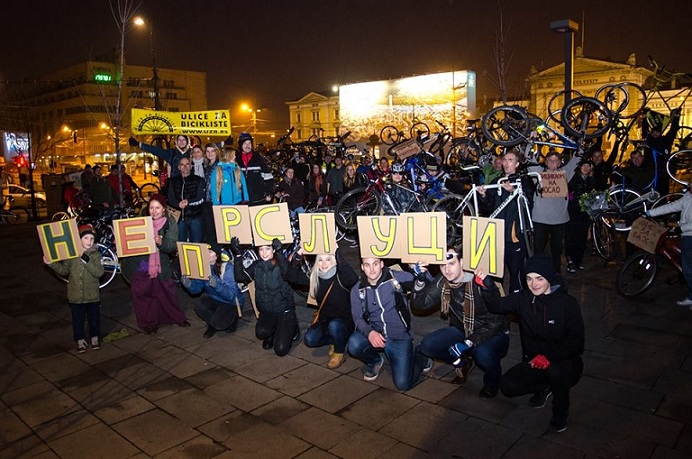
Serbian cycling community unites against the mandatory reflective vests
The Serbian Ministry of Internal Affairs has proposed an obligation for all cyclists to wear light-reflective vests during night time and in poor visibility conditions. With this measure policy makers aim to improve the safety of cyclists by making them more visible to the drivers. However, cycling advocates in Serbia fear that this law will have unintended negative consequences.
Advocates worry that banning cycling for not wearing a specific piece of clothing would result in fewer cyclists on the road, as well as shifting responsibility away from the user of the larger and more powerful vehicle. ”Cyclists will be blamed and considered responsible for accidents because of a lack of wearing a vest, although in most cases cyclists are victims and not contributors to accidents”, says ECF member Novi Sad Cycling Initiative’s (NSCI) President Marko Trifković.
Vests are not the answer; infrastructure is!
NSCI argues that the new proposed legislation is not backed by hard scientific evidence. In reality there is very limited research on the effectiveness of retro-reflective clothing for the safety of cyclists. However, studies do show that the more cyclists on the road the safer each individual cyclist is and the fall in cycling numbers that this law risks will have the opposite effect. Ceri Woolsgrove, ECF Road Safety Policy Officer, says; “Experience from other countries where protective clothing is mandatory tells us that this always leads to a decrease in cycling numbers and the perception of cycling as an unsafe activity, this invariably leads to higher cycling risk. At the same time a road safety intervention that reduces cycling numbers almost always brings about an overall public health disbenefit due to the loss of the health benefits from cycling which almost always outweigh the costs”.
If policy makers wish to improve the safety of cyclists in Serbia, NSCI recommends they focus on cycling infrastructure and education rather than the vest. “We propose more activities on existing traffic policy problems: promotion of lights in night conditions, education of both drivers and cyclists on safe driving and insisting that cycling infrastructure improvement follows best practices from cycling champion countries”, says Trifković.
Cycling advocates join forces to stop mandatory vest legislation in Serbia
Surprisingly Trifković has found a silver lining within the situation; “This proposal united many civil cyclists’ organizations from Serbia efficiently for the first time”. ECF members NSCI and Cycling World Serbia have joined forces with other local cycling organizations and the campaigners have been very vocal on social media and in public debates. Joint efforts have also included a protest during Critical Mass in Belgrade and a public discussion about proper use of lights organized in Šabac, to name a few examples.
However, despite the opposition from NSCI and other cycling advocates, the government is expected to adopt the proposition soon and send it for voting to the Serbian National Assembly. NSCI is therefore looking at ECF and its members from other countries for support. “In 2013 Serbian road safety experts introduced a proposal of mandatory helmets for cyclists. Since our reaction was not taken seriously enough at the moment, we decided to involve ECF. This resulted in the mandatory helmet proposal being discarded”, Trifković tells us. ECF and some national member organization have already sent a letter to the Serbian Minister of Internal Affairs in support of NSCI.
If you wish to voice your support for NSCI you can contact the Serbian Govt here;
- the Serbian Ministry of Internal Affairs bmseu@mup.gov.rs info@mup.gov.rs
- The Serbian Infrastructure Ministry kabinet@mgsi.gov.rs
Please cc NSCI with your mail here office@nsbi.org.rs
About the author
Kaisa Juosila works as a Communications Intern at ECF supporting ECF networks, sponsors and partners
- Log in to post comments
Contact the author
Recent news!
Upcoming events
Contact Us
Avenue des Arts, 7-8
Postal address: Rue de la Charité, 22
1210 Brussels, Belgium











